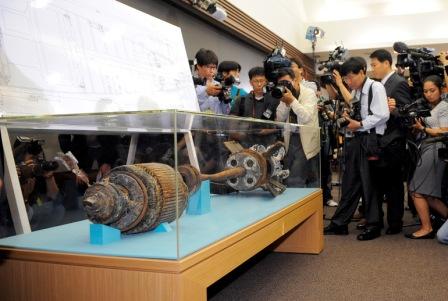A New Phase for Korean Tensions
More on:

With the South Korean finding that a North Korean torpedo was responsible for the sinking of one of its warships in March, focus now shifts to the problematic venue of the UN Security Council. Absent any immediate plans for tough actions directed against the North, the South Korean government is working closely with--and depending on--the United States to lay the groundwork for a case in the Council resulting in clear international disapproval of Pyongyang.
The announcement of the interim results of Seoul’s investigation came on the eve of Secretary of State Hillary Clinton’s visit to Tokyo, Beijing (for the Strategic and Economic Dialogue), and Seoul, with the clear intent of making this a major issue on her agenda, particularly with Beijing. But Clinton’s briefing book for Beijing is bulging, with Iran and Thailand joining North Korea as items that require special discussions alongside the main issues on the S&ED agenda.
China has already signaled its preference to look past the sinking of the Cheonan in favor of its "traditional friendship" with Pyongyang. The PRC was late to issue condolences on the incident, and China’s recent decision to host Kim Jong-Il in Beijing only days after meeting with Lee Myung-bak in Shanghai was regarded in Seoul as insensitive in light of the ongoing investigation and North Korea’s suspected role in the sinking.
South Korean efforts to brief China on the results of the investigation in advance of the May 20 briefing were rebuffed. South Korea needs strong U.S. backing to make the case to China for a UN statement. But given China’s discomfort with the issue, a Security Council Presidential Statement is more likely to garner support than another resolution condemning North Korea.
Another factor that China will point to as reason for caution is the North Korean threat that international condemnation could lead to "all out war." North Korea is still smarting from the Council Presidential Statement in April 2008 condemning its missile launch; China well knows that the immediate response to last year’s UN condemnation of North Korea was additional escalation, including a second North Korean nuclear test.
The United States and South Korea together must make the case to China that North Korea’s actions are detrimental to China’s own interests in regional stability. The Security Council debate will test China’s willingness to give North Korea carte blanche to pursue low-level provocations with impunity. The UN process will also show how far the United States will be willing to go on South Korea’s behalf in working for a strong statement, and could test South Korea’s presumption that it has sufficient international diplomatic clout to extract a cost against North Korea.
More on:
 Online Store
Online Store
